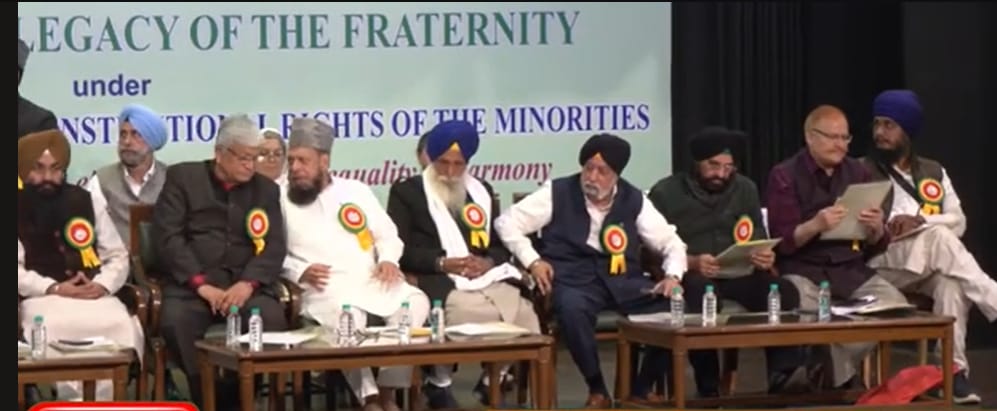
Leaders from the Sikh and Muslim communities gathered at the Combined Movement for Constitutional Rights of the Minorities (CMCRM) Conference 2025, held at the IICC auditorium, to reaffirm their commitment to unity and constitutional rights. The event, themed around the ‘Malerkotla Legacy,’ highlighted growing concerns over marginalization and the need for solidarity in today’s political climate.
Former Jathedar of Takht Sri Damdama Sahib, Giani Kewal Singh, voiced frustration over the unfulfilled promise of equality in India. He lamented that despite the Constitution guaranteeing equal rights, minority communities still feel betrayed. Recalling the historical sacrifices made by Sikhs and Muslims, he stressed that their struggle continues, particularly in movements like the farmers’ protests.
Former Delhi Sikh Gurdwara Management Committee president Sardar Paramjit Singh Sarna echoed these concerns, warning that both communities face threats unless they stand together. “There will always be forces trying to divide us, but for national integrity, we must unite,” he said.
Former hockey player Aslam Sher Khan emphasized the historical strength of Sikh-Muslim cooperation, pointing to their collective contributions in politics, sports, and national struggles. He cited the 1975 Hockey World Cup victory as an example of their unity yielding success. He also reflected on how events like the Babri Masjid demolition marked a turning point, making it even more important to revive the ‘Malerkotla Spirit.’
Journalist Paramjeet Singh Gazi highlighted the political shifts since 2014, noting that decisions like the CAA and the Farmers’ Bills were imposed without consent. “The state no longer asks for our approval. It simply enforces its will,” he said, calling for broader alliances among marginalized groups.
Personal testimonies underscored the urgency of the issue. Bibi Ranjeet Kaur recalled the 1984 anti-Sikh riots, speaking of the isolation her community felt in the aftermath. “That moment made me realize how vulnerable we were. We must ensure history does not repeat itself,” she said.
Maulana Parry Hassan Afzal Firdosi, Mirwaiz of North Kashmir, recounted the story of the Nawab of Malerkotla, Sher Mohammad Khan, who opposed the execution of Guru Gobind Singh’s sons. He noted how this act of defiance ensured Malerkotla remained peaceful even during Partition. “This legacy of solidarity must be revived across India,” he urged.
Sikh scholar Prampal Singh Sabra reflected on the deep historical ties between the two communities, citing Guru Nanak’s relationship with Bhai Mardana. “Our unity is not new; it is centuries old. We must reinforce it now more than ever,” he said.
Former police officer M.W. Ansari called for deeper cultural and intellectual collaboration beyond political unity. Meanwhile, in his presidential address, Maulana Obaidullah Khan Azmi reminded the audience of their shared past before colonial rule divided them. “The forces of division still operate, but we must resist them with greater determination,” he declared.
The conference concluded with a strong pledge to strengthen Sikh-Muslim solidarity and push back against divisive forces threatening India’s pluralistic identity.
Author Profile

Latest entries
 REGIONALApril 7, 2025‘I said Godse Murdabad and it triggered them’: Kashmiri MLA alleges attack by BJP amid ruckus in assembly over Waqf Bill
REGIONALApril 7, 2025‘I said Godse Murdabad and it triggered them’: Kashmiri MLA alleges attack by BJP amid ruckus in assembly over Waqf Bill REGIONALApril 7, 2025Budget session 2025: Three bills passed by Jammu Kashmir assembly, say officials
REGIONALApril 7, 2025Budget session 2025: Three bills passed by Jammu Kashmir assembly, say officials  REGIONALApril 7, 2025One more Hurriyat associate from Kashmir quits separatism
REGIONALApril 7, 2025One more Hurriyat associate from Kashmir quits separatism INDIAApril 7, 2025Saudi Arabia halts Umrah, visit visas for 14 nations including India
INDIAApril 7, 2025Saudi Arabia halts Umrah, visit visas for 14 nations including India
